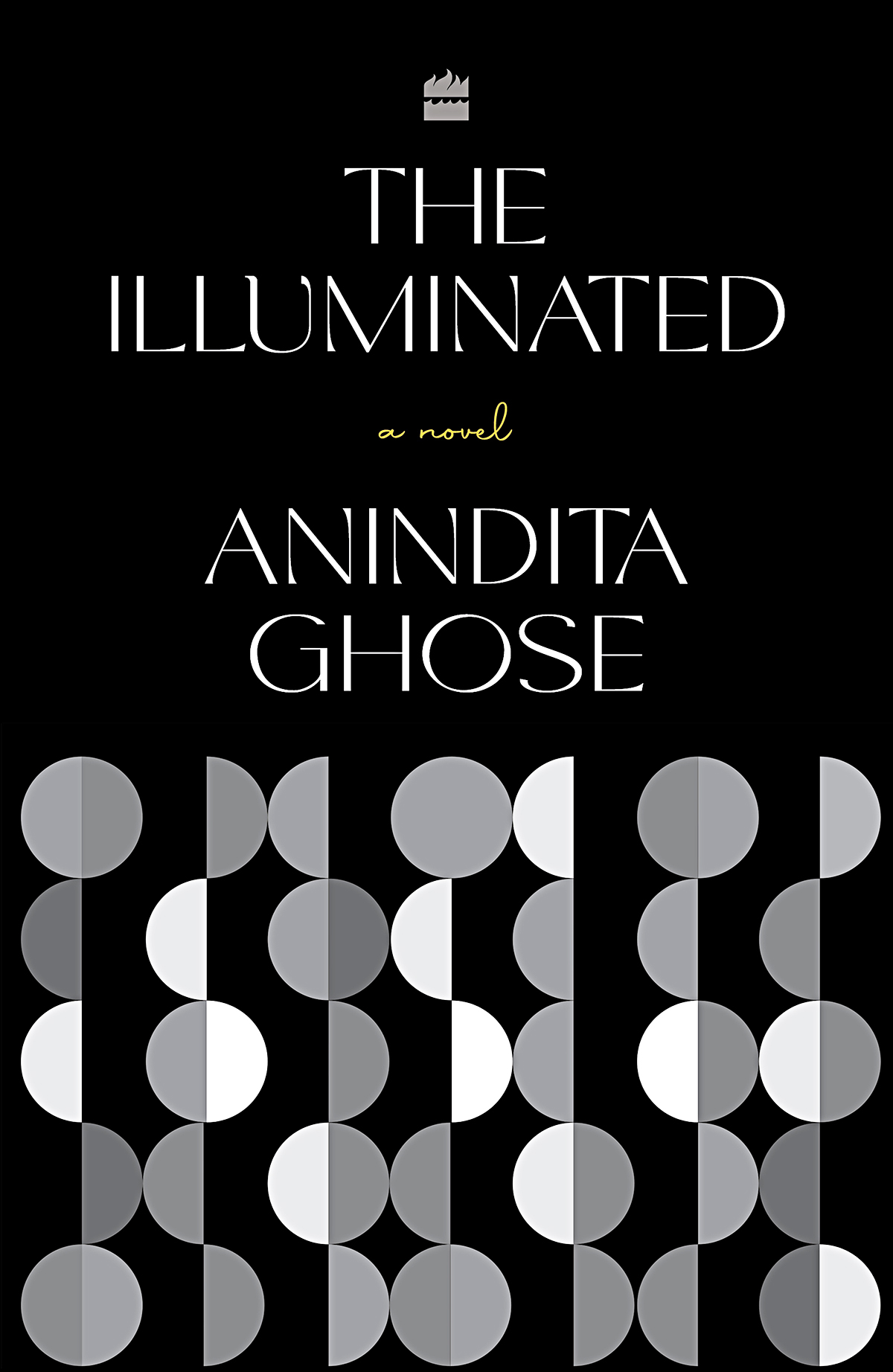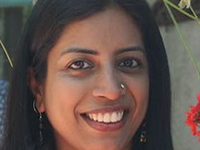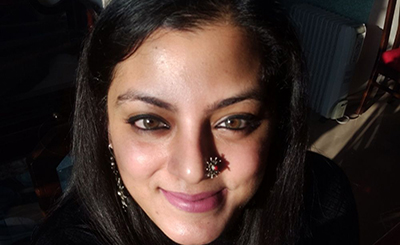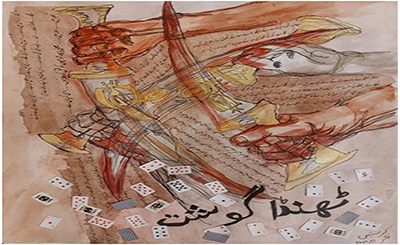
Anindita Ghose, author of The Illuminated. Photo: Preeti Verma
The journalist-turned-author on her debut novel, The Illuminated, centred on powerful themes, such as women searching for their identities amidst the rising tide of religious fundamentalism in India
“Men and women eat, drink, spill, shit. But the task of cleaning has always fallen on women. It is women who keep the world clean. They’re taught its importance early. Is it any wonder that a woman invented the dishwasher and windshield wiper? It starts with their body, restoring itself every month. They wash their faces, homes, memories. They clean their histories to keep the peace. In the Mahabharata, Draupadi is given a boon to restore her virginity at the end of each year she spends with each of her five husbands. But is it a boon for her or the five brothers? In the books about Draupadi written by women, it is a curse. That’s why they don’t like women writing books. It reveals uncomfortable truths.”
Mumbai-based journalist and writer Anindita Ghose’s debut novel, The Illuminated (HarperCollins India), is a story about two women: Shashi Mallick and her fiercely independent daughter Tara. A woman in her fifties, Shashi suddenly loses her celebrated architect husband Robi, who has a stroke while they are visiting their son and daughter-in-law in the US. Forced to perform his funeral in New Jersey, away from their family and friends in India, Shashi goes back into her past, recalling her youth, courtship and early days of marriage with Robi.
She was twenty-two and Robi was thirty when they married. The Mallick household was modern, and Shashi continued to pursue her Master’s degree after her marriage. Some years later, they moved from the family’s North Kolkata home to Delhi, where Tara was born. Shashi is struck by the thought that she had never known love — unlike the modern love her children had experienced — her son had a broken relationship before he met his American wife and her daughter had had numerous boyfriends.
Slowly coming to terms with her new life condition, Shashi realises that over the years, she has lost touch with many of her hobbies and interests, such as grafting, making bonsais, gardening, crosswords, tea and Hindi movie trivia. Moreover, she finds it hard to begin life again. “It was so much easier to take the road that has been planned, for which obstructions have been cleared, the soil prepared, the concrete poured and compressed. A road that even has pygmy palms planted on either side for an illusion of symmetry, a token of beauty.”
Her daughter, Tara, is a Sanskrit scholar who is sucked into a relationship with an older man at the Indian Institute of Languages and Literature in Mysore where she is pursuing a PhD in Sanskrit poetics. The man in question is a 52-year-old erudite professor, Amitabh Dhar, the Sanskrit and Indian Textual Traditions chair from the University of Chicago, who had come to Tara’s college for a special collaborative project. After the publication of his controversial book, Dhar is accused of hurting the religious sentiments of Hindus. The target of a lawsuit, he is under threat and even offered protection by the government. When Tara volunteers for the role of the project lead, she finds that she is deeply infatuated with the mysterious Dhar who assaults and then discards her — taking away from her something that she really wanted — and making herself lose parts of herself that she would never be able to see again.
The tumultuous episodes of the past year lead Tara to go live in the small hilly town of Dharamshala in the Himalayan foothills. While she is here, she receives the news of her father’s death, and recalls numerous memories of his from her childhood. “When a loved one dies, the best memories stand as beacons, casting shadows on the ordinary ones, wholly obscuring the less favourable ones.” Since her family is unable to reach Tara in time, they decide to go ahead with her father’s last rites without her — whom he loved most in the world; “the light of his eyes”—which, despite the circumstances, leaves a kind of chasm between her and Shashi.
And so, both mother and daughter find themselves divided by the death of a man who bound them. Along with Robi’s old friend, Bibek Burman, Shashi finally goes to Dharamshala to end the long impasse and make truce with Tara. As the two women unite, Tara confesses to her about her recent life events, while soon realising that a single incident can make us see everything, maybe our whole lives, differently. “The quality of light that we see things in matters. When the light shifts, we see the world differently.” This new way of seeing gives Tara courage, and she decides to return to her campus and meet her professors.

The Illuminated: A Novel
By Anindita Ghose
HarperCollins India
pp. 299, Rs 599
The book is centred on powerful themes, such as women searching for their identities amidst the rising tide of religious fundamentalism in India. As the story progresses, there are many shades in which this is depicted. For instance, at Tara’s college campus, there are strict restrictions on dress code/appearance as per the recommendations of a volunteer political organization originally set up to serve the interests of women, the Mahalaxmi Seva Sangh. The ‘sevaks’ also make regular checks in the girls’ hostel, which has strict rules against smoking and drinking. Further, the MSS routinely distributes circulars that suggest appropriate jobs for widows, extol the virtues of an ideal Indian wife as well as warn about the dangers of women living alone and the ills of having children born of mixed religion and inter-caste marriages. “The sevaks were invested in all matters of Indian culture, because they believed it was the corruption of Indian culture that was corrupting Indian women.”
In contrast with this though is another interesting character in the book: KC Meenakshi, India’s lone licensed deep sea fisherwoman, who goes on to become the chief minister of the new state of Meenakshi where she decides to form an all-women cabinet. Shashi finally decides to move to Meenakshi where she sets up a juvenile home. Through its sensitive prose, the book also makes some powerful insights and observations about the India that we live in today, and what it might look like in the near future.
Ghose has been the editor-in-chief of the award-winning Saturday magazine Mint Lounge and the features director of Vogue India. With an MA in Linguistics from the University of Mumbai, she completed her MA in Arts & Culture Journalism from Columbia University’s Graduate School of Journalism in New York. In 2019, she was elected a Hawthornden Writing Fellow. She has been published in a wide selection of national and international platforms.
In this interview, she talks to us, among other things, about the inspiration behind her debut novel, the research that went into it, her journey so far as a writer, her literary inspirations and how the pandemic affected her writing process. Excerpts:
How did you come up with the story for The Illuminated?
That’s a difficult question to answer, but I can tell you that it started with the image of a woman who has lost her husband, a towering and charismatic figure who defined the lives of those who circled him. But even as she grapples with the loss, all she wants is a cup of tea. The tea is everything she wants for herself. The death makes her appraise her life and her desires.
Stories, for me, start with an image or a specific emotion. This was the image that led to The Illuminated. It grew from there. I was interested in exploring the idea of how much of women’s identities are defined by the men in their lives and so the woman’s daughter worked her way in. The repercussions of the loss are very different for the two women because of the different nature of their relationships to the man. The rest are from dreams and notes and buried anger over the years.
The book touches upon the theme of religious fundamentalism that seems determined to put women in their place. Were you motivated by what is happening around us?
Looking at the world around us, and the news every day, it is impossible not to be motivated to do something to address the status quo. Recently, there were reports of a 17-year-old girl in Uttar Pradesh’s Deoria district beaten to death by her male relatives for wearing jeans and a mob in Gujarat’s Dahod district thrashing two teenage girls for talking on mobile phones. Religious organisations of all manners are frequently imposing rules on how women should dress and live and love. It was not a choice I made. It is impossible to ignore what is happening around us.
Tell us about the scale of research that went into writing the book.
I read what I thought my characters would read, which seemed like a brilliant idea at times and Sisyphean at others because my characters are rather scholarly. Perhaps it was a way to procrastinate writing.
Shashi is a student of philosophy at Jadavpur University so I made attempts to read Hegel and Sri Aurobindo — my family is related to him but that didn’t make it easier. For Tara, I read Sanskrit poets such as Bhartihari and Bilhana in translation. I also read Simone de Beauvoir’s The Second Sex very closely — I believe her book is still very relevant.
But I want to stress that research for a novel is never only about facts. It is about insights that bore through the patina of fact. And that is research a writer does subconsciously.
Tell us about your journey as a writer — from being a journalist and editor to an author?
I’ve been writing for as long back as I can remember but I come from a family of professionals and I was brought up with the notion that I needed to have a salary and a career to be an adult. I didn’t really have the liberty at 22 to say, okay done with college, now I’m going to hang around at home and try writing a novel. Also the commercials of fiction writing in India for someone starting out don’t make sense — unless you have a trust fund to live off!
Journalism was an excellent way to make a career out of something I liked doing and that is why I went into it. I enjoyed being a journalist and editor tremendously but at some point it felt limiting, especially in the New India with its new rules of what can and cannot be published.
The mindset and worldview required for each is very different, actually at odds with each other. It was quite a steep learning curve.
Who are some of your favourite fiction writers?
For short stories, no one can beat Anton Chekhov for me. As novel writers, I love Julian Barnes, Jhumpa Lahiri, Toni Morisson, Jonathan Franzen, Zadie Smith, Margaret Atwood, Akhil Sharma... and of course, that one book by Arundhati Roy (The God of Small Things). I read it when I was 13 and it changed my life. More recently, I have become obsessed with Clarice Lispector.
Which are some of your all-time favourite books?
Freedom by Jonathan Franzen, The Namesake by Jhumpa Lahiri, Family Life by Akhil Sharma, Disgrace by JM Coetzee… this is very hard!
Who or what are some of your biggest literary inspirations?
The novels and writers I love are my biggest inspirations. They are also my best teachers.
How has the pandemic affected your writing process?
I wrote this book over five years and I had full-time jobs through that. So I wrote in bursts over weekends or late nights or whatever getaways I could manage. A lot of intense writing happened through 2019 and just when I finished in April 2020 is when the pandemic hit us. It felt like a cruel joke because I had been desperately trying to self-isolate until then, telling myself, after this I will meet people again. And just when I was ready, the world plunged to this. The pandemic has mostly been a time of final edits and all the stuff that goes into the last stages of publishing a book and not actual writing. Though I’m beginning to read and make notes for my next novel now.
What are you working on next?
I plan to write many more books, novels hopefully, especially now that I know I can finish one.
More from The Byword
Comments
*Comments will be moderated











